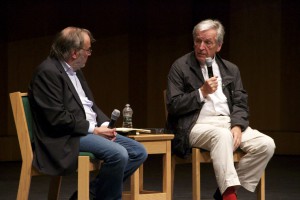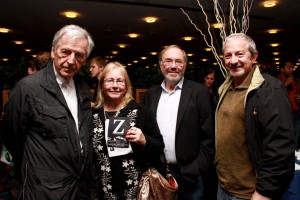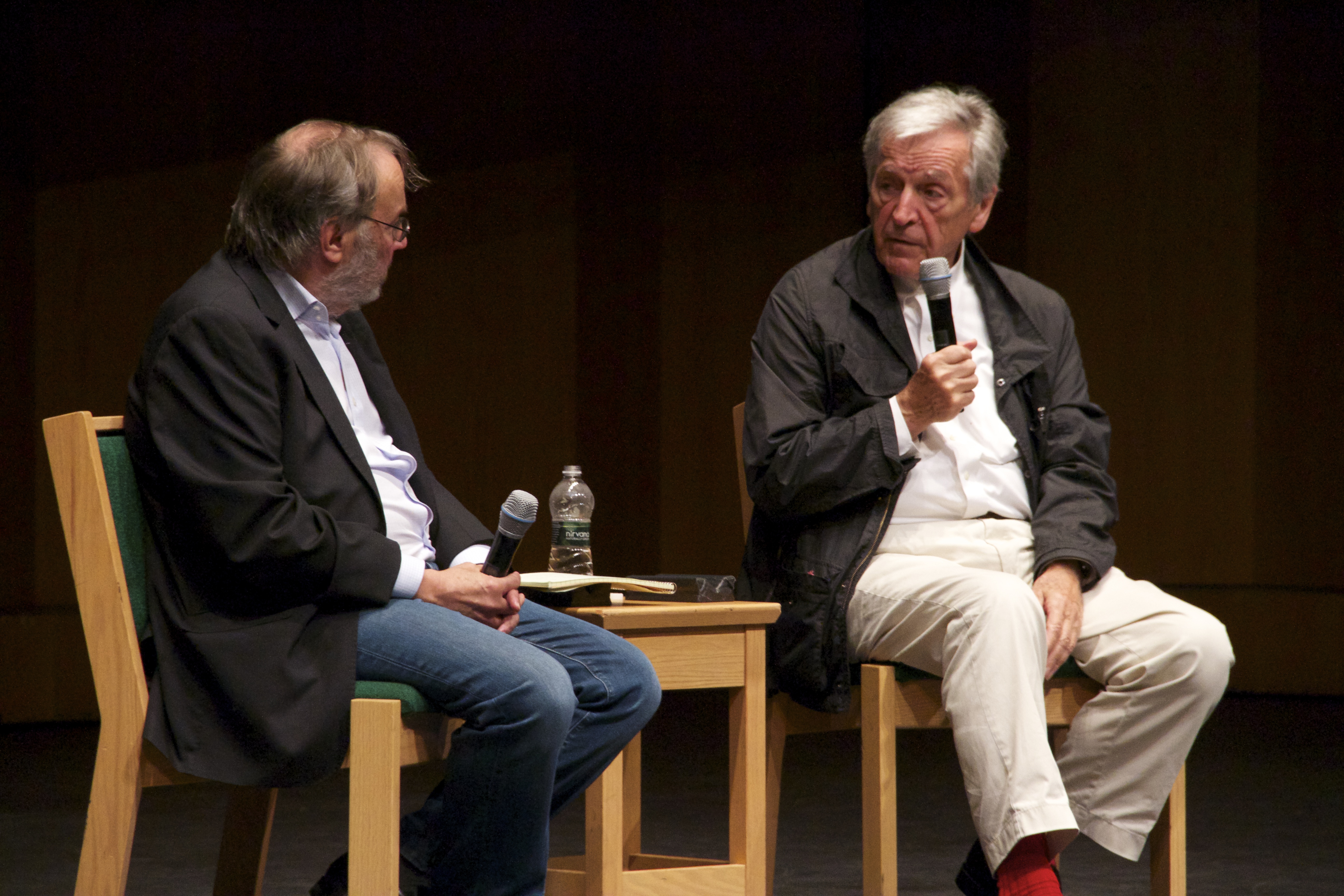Photo by Alanna Morton
Movie director Costa-Gravas present at a screening of “Z” at Purchase College.
The opportunity to view a special screening of the movie “Z” in the wonderful settings of the Performing Arts Center of Purchase College, followed by a Q&A by the director Costa Gravas was very appealing and seemed to be unique in many ways. Costa-Gravas, or Costa Gravas as often cited, is a Greek-born French naturalized movie director who was denied the emigration to United States in 1951 because of his father, who had been a member of the left-wing EAM branch of the Greek resistance, and was imprisoned after the war as a suspected communist. The film maker, whose real name is Constantinos Gravas and assumed the name Costa-Gravas because this abbreviated form had erroneously appeared in his first movie posters and it would have cost too much to reprint them with the correction, was also denied an entrance visa to the USA as a student of a film school. For Costa-Gravas to be here in the USA was certainly not a first, but to be able to meet this filmmaker, who originally was somewhat black-listed as an individual and is now a celebrated member of the film industry, was surely an occasion not to miss. The fact that he had one of my baptismal first names (my family was very generous with me and gave me three names) and that both I and my daughter are Purchase College alumni made it even more interesting on a personal basis, and to explain why that is so, would probably fill a tome and not interest the reader… Regardless, it was a great chance and it turned out even better.
 The movie, which I confess I had not previously seen, was extraordinary under all aspects. The rhythm of the narration is fast-paced and maintains the interest of the viewer to the point where one forgets that it’s a movie and gets so involved in the story as to feel actually present at the unjust conclusion. I had witnessed the remarkable ability of the director to keep the viewer involved few years ago in the Oscar-nominated movie “Missing”, a harrowing story of the disappearance of an American journalist during the Chilean coup d’état of 1973 and the attempts of his father to discover the truth. To identify with the tortured soul of a father who wants to know the fate of his son seemed to be a more natural direction to take than to get involved in the politics of the Greek people; but it wasn’t so.
The movie, which I confess I had not previously seen, was extraordinary under all aspects. The rhythm of the narration is fast-paced and maintains the interest of the viewer to the point where one forgets that it’s a movie and gets so involved in the story as to feel actually present at the unjust conclusion. I had witnessed the remarkable ability of the director to keep the viewer involved few years ago in the Oscar-nominated movie “Missing”, a harrowing story of the disappearance of an American journalist during the Chilean coup d’état of 1973 and the attempts of his father to discover the truth. To identify with the tortured soul of a father who wants to know the fate of his son seemed to be a more natural direction to take than to get involved in the politics of the Greek people; but it wasn’t so.
The distressing chronicle of the struggle by the Greek people to have a democratic nation versus the continuous effort by the reigning right-wing military government to annihilate this possibility at any cost is edited in a way that does not allow the viewer to catch his or her breath (the movie won an Oscar for that). One does not watch this movie, but lives it as a personal experience, a witness of the injustice of a system that regards self-preservation the most important of all its  beliefs. Only relief, one that could not occur at the viewing in 1969, was the knowledge that Christos Sartzetakis, the investigative magistrate who had pursued the killers of the democratic Greek politician Grigoris Lambrakis just to find himself unable to counteract the suppression of the truth by the military junta and removed from the case, eventually (22 years after) was elected president of Greece.
beliefs. Only relief, one that could not occur at the viewing in 1969, was the knowledge that Christos Sartzetakis, the investigative magistrate who had pursued the killers of the democratic Greek politician Grigoris Lambrakis just to find himself unable to counteract the suppression of the truth by the military junta and removed from the case, eventually (22 years after) was elected president of Greece.
A movie without time barriers or unnecessary emotional filters, which should be seen by all for its factual narration, veiled at times of dry humor, as much as for its straight-forward but smooth cinematography.
 After the screening, Costa-Gravas, known for his integration of controversial political subjects with commercial cinema, a feature that allowed these topics to be known to the mass, participated to a Q&A, run by Professor Chuck Worman; this thrilled the attentive audience and satisfied the curiosity of the many students and visitors present. The legendary director used a powerful blend of charm and wit that captivated the audience and made the evening even more rewarding. In his answers, he gave a brief background of his youth and his early film experiences, narrated amusing anecdotes tied to the filming of “Z”, exposed his personal feeling on that dark period of his original country, and offered accounts and information regarding his movies and the stars he worked with.
After the screening, Costa-Gravas, known for his integration of controversial political subjects with commercial cinema, a feature that allowed these topics to be known to the mass, participated to a Q&A, run by Professor Chuck Worman; this thrilled the attentive audience and satisfied the curiosity of the many students and visitors present. The legendary director used a powerful blend of charm and wit that captivated the audience and made the evening even more rewarding. In his answers, he gave a brief background of his youth and his early film experiences, narrated amusing anecdotes tied to the filming of “Z”, exposed his personal feeling on that dark period of his original country, and offered accounts and information regarding his movies and the stars he worked with.
To complete our wonderful experience, Costa-Gravas appeared at an after-show cocktail party, where he kept on sharing his wit and demonstrating his charisma with the College’s top echelon administrators and special guests.






